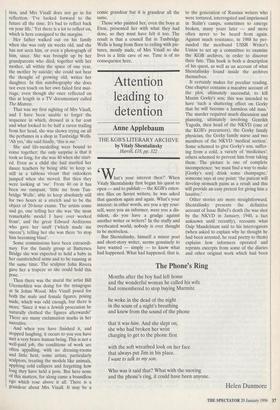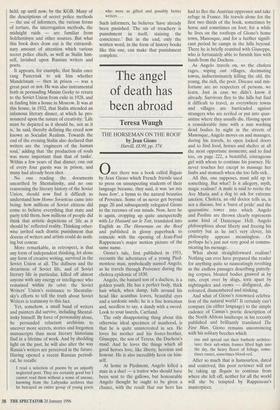Attention leading to detention
Anne Applebaum
THE KGB'S LITERARY ARCHIVE by Vitaly Shentalinsky Harvill, £18, pp. 322 What's your interest then?' When Vitaly Shentalinsky first began his quest to open — and to publish — the KGB's exten- sive files on Soviet writers, he was asked that question again and again. What's your interest: in other words, are you a spy your- self, were you an informer, were you a dis- sident, do you have a grudge against another writer or writers? In the stuffy and overheated world, nobody is ever thought to be motiveless.
But Shentalinsky, himself a minor poet and short-story writer, seems genuinely to have wanted — simply — to know what had happened. What had happened, that is, to the generation of Russian writers who were tortured, interrogated and imprisoned in Stalin's camps, sometimes to emerge broken, many years later — and more often never to be heard from again. Against much resistance, in 1988 he per- suaded the moribund USSR Writer's Union to set up a committee to examine the KGB archives, in order to discover their fate. This book is both a description of his quest, as well as an account of what Shentalinsky found inside the archives themselves.
It certainly makes for peculiar reading. One chapter contains a macabre account of the plot, ultimately successful, to kill Maxim Gorky's son; this was intended to have 'such a shattering effect on Gorky that he will become a harmless old man.' The murder required much discussion and planning, ultimately involving Genrikh Yagoda, then head of the NKVD (one of the KGB's precursors), the Gorky family physician, the Gorky family nurse and two members of the NKVD 'medical section'. Some schemed to give Gorky's son, suffer- ing from a cold, a variety of `medicines'; others schemed to prevent him from taking them. The picture is one of complete incompetence: 'we must find a way to make [Gorky's son] drink some champagne,' someone says at one point: 'the patient will develop stomach pains as a result and this will provide an easy pretext for giving him a laxative.'
Other stories are more straightforward. Shentalinsky presents the definitive account of Isaac Babel's death (he was shot by the NKVD in January, 1940, a fact unknown until recently), recounts what Osip Mandelstam said to his interrogators (when asked to explain why he thought he had been arrested, he read poetry to them) explains how informers operated and reprints excerpts from some of the diaries and other original work which had been held, up until now, by the KGB. Many of the descriptions of secret police methods — the use of informers, the various forms of torture, the interrogation methods, the midnight raids — are familiar from Solzhenitsyn and other sources. But what this book does draw out is the extraordi- nary amount of attention which various secret police chiefs, as well as Stalin him- self, lavished upon Russian writers and poets.
It appears, for example, that Stalin once rang Pasternak to ask him whether Mandelstam — then in prison — was a great poet or not. He was also instrumental both in persuading Maxim Gorky to return to the Soviet Union from exile in 1928, and in finding him a house in Moscow. It was at this house, in 1932, that Stalin attended an infamous literary dinner, at which he pro- nounced upon the nature of creativity: 'Life must be depicted as it should be, not as it is,' he said, thereby defining the creed now known as Socialist Realism. Towards the end of the evening Stalin also declared that writers are the 'engineers of the human soul,' adding that 'the production of souls was more important than that of tanks'. Within a few years of that dinner, one out of every four guests was in prison, and many had already been shot.
No one reading the documents unearthed by Shentalinsky, and no one reassessing the literary history of the Soviet Union, should now find it difficult to understand how Homo Sovieticus came into being: how millions of Soviet citizens did come to believe everything that state and party told them, how millions of people did think that artistic depictions of 'life as it should be' reflected reality. Thinking other- wise invited such drastic punishment that dozens of writers and artists could do noth- ing but concur.
More remarkable, in retrospect, is that any form of independent thinking, let alone any form of creative writing, survived in the Soviet Union at all. The dullness and the dreariness of Soviet life, and of Soviet literary life in particular, killed off almost anyone with any energy or intelligence who remained within its orbit: the Soviet Writers' Union's resistance to Shentalin- sky's efforts to tell the truth about Soviet Writers is testimony to this fact.
Yet, somehow, a small band of writers and painters did survive, including Shental- insky himself. By force of personality alone, he persuaded reluctant archivists to uncover more secrets, stories and forgotten manuscripts than most literary historians find in a lifetime of work. And by shedding light on the past, he will also alter the way Russia's writers are perceived in the future. Having opened a recent Russian periodi- cal, he recalls:
I read a selection of poems by an unjustly neglected poet. They are certainly good but I cannot read them without a sense of unease, knowing from the Lubyanka archives that he betrayed an entire group of young poets who were as gifted and possibly better writers ...
Such informers, he believes 'have already been punished. The sin of treachery is punishment in itself, staining the conscience.' But in the end, only the written word, in the form of history books like this one, can make that punishment complete.



























































 Previous page
Previous page